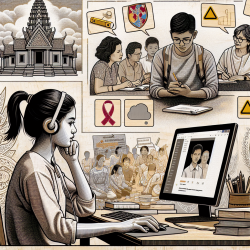As practitioners dedicated to improving the lives of young people, it is crucial to stay informed about the various factors that influence their behaviors and risks. A recent study titled "Youth paying for sex: what are the associated factors? Findings from a cross-sectional study in Cambodia" provides valuable insights into the socio-demographic and behavioral characteristics of at-risk male youth who engage in transactional sex. This blog aims to highlight key findings from the study and explore how practitioners can leverage this information to enhance their interventions.
The Context of Youth Paying for Sex in Cambodia
The study conducted a cross-sectional survey involving 405 sexually active male youth aged 16-24 in Phnom Penh and seven provinces in Cambodia. The findings revealed that a significant proportion (82.5%) of respondents had paid for sex within the past year. Factors such as age, urban residency, marital status, daily expenses, and the number of sexual partners were identified as significant predictors of engaging in transactional sex.
Key Findings
- Youth older than 18 years were more likely to pay for sex (AOR = 3.60).
- Urban residency increased the likelihood of paying for sex (AOR = 2.29).
- Unmarried youth had a higher propensity to engage in transactional sex (AOR = 9.58).
- Youth spending less than $2.55 USD per day were more likely to pay for sex (AOR = 2.22).
- A higher number of sexual partners in the past year was strongly associated with paying for sex (AOR = 16.73).
Implications for Practitioners
The study underscores the need for targeted interventions that address both the demand and supply sides of sex work. Here are some strategies practitioners might consider:
1. Targeting Urban Youth
Given that urban residency is a significant factor, interventions should focus on urban areas where youth are more likely to engage in risky behaviors. Community-based programs that provide education on safe sexual practices and access to health services can be particularly effective.
2. Addressing Cultural Norms
Cultural norms around masculinity and sexuality play a crucial role in shaping young men's behaviors. Practitioners can work towards changing these perceptions through public education campaigns that promote healthy relationships and challenge harmful stereotypes.
3. Enhancing Economic Opportunities
Youth with limited financial resources are more likely to pay for sex as a means of fulfilling social or sexual needs. Programs that offer vocational training and employment opportunities can help reduce economic vulnerabilities and provide alternative pathways for young people.
4. Promoting Safe Sexual Practices
The study highlights low rates of HIV testing among youth who pay for sex despite high condom use with sex workers. Practitioners should emphasize the importance of regular HIV testing and offer convenient testing options to encourage safer sexual practices.
Encouraging Further Research
This study provides a foundation for understanding the factors associated with youth paying for sex in Cambodia, but there is still much to learn. Practitioners are encouraged to conduct further research to explore additional variables and develop comprehensive intervention strategies tailored to specific community needs.
To read the original research paper, please follow this link: Youth paying for sex: what are the associated factors? Findings from a cross-sectional study in Cambodia.










